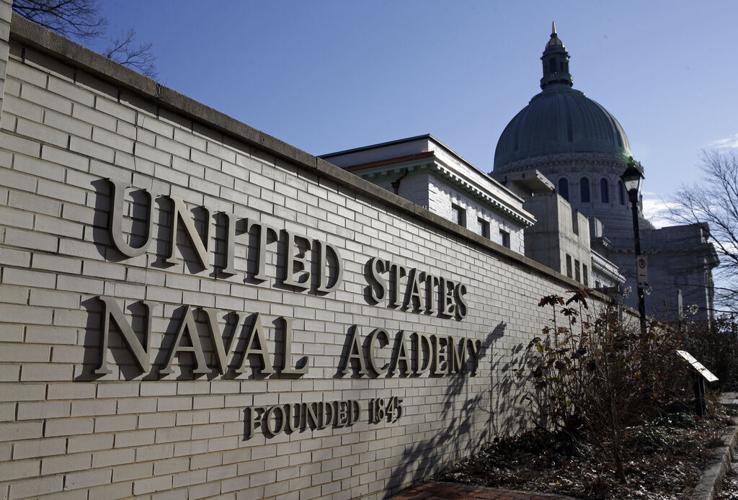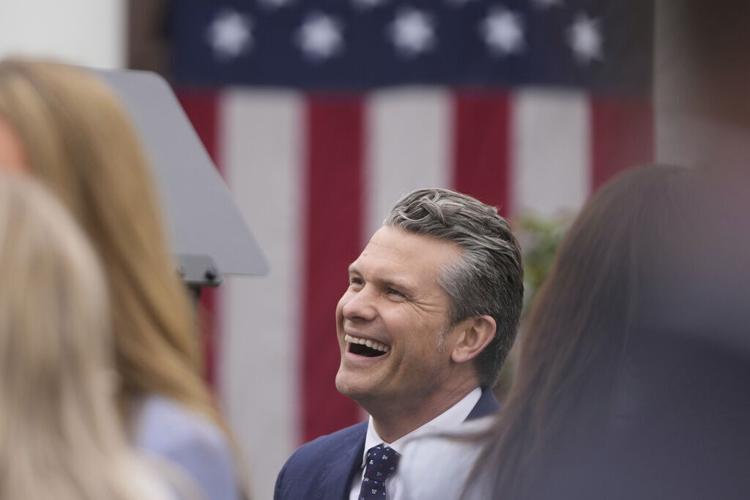WASHINGTON — Books on the Holocaust, histories of feminism, civil rights and racism, and Maya Angelou's award-winning autobiography, “I Know Why the Caged Bird Sings,” were among the nearly 400 volumes  this week after Defense Secretary Pete Hegseth’s office ordered the school to get rid of ones that .
The Navy late Friday provided  that were taken out of its library. The move marks another step in the Trump administration’s far-reaching effort to  from federal agencies, including policies, programs, online and social media postings and curriculum at schools.
People are also reading…

FILE - An entrance to the U.S. Naval Academy campus in Annapolis, Md., is seen Jan. 9, 2014. (AP Photo/Patrick Semansky, File)
The list includes “Memorializing the Holocaust,” which deals with Holocaust memorials; “Half American,” about African Americans in World War II; “A Respectable Woman," about the public roles of African American women in 19th century New York; and “Pursuing Trayvon Martin,” about the 2012 shooting of the Black 17-year-old in Florida that raised questions about racial profiling.
Other books clearly deal with subjects stridently targeted by the Trump administration, including gender identity, sexuality and . A wide array of books on race and gender were targeted, dealing with such topics as African American women poets, entertainers who wore blackface and the treatment of women in Islamic countries.
Also on the list were historical books on racism, the Ku Klux Klan and the treatment of women, gender and race in art and literature.
In a statement, the Navy said officials went through the Nimitz Library catalog, using keyword searches, to identify books that required further review. About 900 books were identified in the search.
“Departmental officials then closely examined the preliminary list to determine which books required removal,” said Cmdr. Tim Hawkins, Navy spokesman. “Nearly 400 books were removed from Nimitz Library to comply with directives outlined in Executive Orders issued by the President.”

Defense Secretary Pete Hegseth arrives before President Donald Trump speaks during an event to announce new tariffs in the Rose Garden at the White House, Wednesday, April 2, 2025, in Washington. (AP Photo/Mark Schiefelbein)
The books were removed shortly before Hegseth arrived Tuesday for a visit to the academy, which already was planned and not connected to the library purge, officials said.
The Pentagon said the academies are "fully committed to executing and implementing President Trump’s Executive Orders.”
The Naval Academy in Annapolis, Maryland, the Air Force Academy near Colorado Springs, Colorado, and the U.S. Military Academy in West Point, New York, were not included in President Donald  that banned DEI instruction, programs or curriculum in kindergarten through 12th grade schools that receive federal funding. That is because the academies are colleges.
Pentagon leaders, however, turned their attention to the Naval Academy last week when a media report noted that the school had not removed books promoting DEI.
A U.S. official said the academy was told late last week to conduct the review and removal. It isn’t clear if the order was directed by Hegseth or someone else on his staff.
A West Point official confirmed this week that the school completed a review of its curriculum and was prepared to review library content if directed by the Army. The Air Force and Naval academies also reviewed their curriculum, as required.
An Air Force Academy official said the school continually reviews its curriculum, coursework and other materials to ensure it all complies with executive orders and Defense Department policies.
Last week, Lt. Gen. Tony Bauernfeind, the Air Force Academy superintendent, told Congress that the school was in the middle of its course review, but there was no mention of books.
The officials spoke on condition of anonymity to discuss academy policies.
Hegseth aggressively pushed the department to erase DEI programs and online content, but the campaign was met with questions from angry lawmakers, local leaders and citizens  and historic mentions from Defense Department websites and social media pages.
How one US organization reunites military personnel with the animals they rescued overseas
How one US organization reunites military personnel with the animals they rescued overseas

While deployed in Kosovo in May 2024, U.S. Army Reserve physical therapy assistant Elvia Azuara saw many stray cats running around one of the bases—including a sweet little black and white female kitty, known mostly as Fent.
Azuara noticed her one day during lunch and she fed fries to Fent. Soon, this became a regular bonding activity for them. "I guess she knew my routine," Azuara said in an interview with Stacker. "Whenever I was there, she would just pop up out of nowhere and she would wait for her fries."
But four months later, in October, Azuara got word that her deployment was ending—and she was devastated to leave the kitty, especially as winter approached. And that's where stepped in.
profiled the work of the U.S. nonprofit, which reunites military personnel with the animals they bonded with while serving overseas. Founded by Robert Misseri in 2014, Paws of War has helped rescue over 5,000 dogs and cats for nearly 1,000 veterans. The organization filled an increasing need for officers in the Air Force, Marines, Army, Coast Guard, and Army Reserves who served overseas, bonded with a dog or a cat, and didn't want to leave them behind in an uncertain situation.
The organization serves a dual purpose by reuniting service members grappling with the aftermath of war with animals needing care. And for veterans suffering from post-traumatic stress disorder, their furry companions not only bring joy but also help them heal.
"We have troops all over the world and the sacrifices that those people make is pretty great," said Paws of War volunteer Gary Baumann, who volunteers with the "War Torn Pups & Cats" program. "We feel like asking them to leave these animals behind is a sacrifice they shouldn't have to make," he told Stacker.

High costs but high rewards

Azuara heard about the program from service members who had previously been deployed at the base. After she bonded with Fent, she submitted her application to bring the kitty home to the U.S.
"I was a little skeptical at the beginning, to be honest, because I was like, 'Oh, I don't know why would they do it for free,'" she said, "but I don't lose anything by just checking it out."
The "War Torn Pups & Cats" program costs nothing for service members—donors primarily fund it. In 2023, Paws of War raised over $4 million from contributions and grants.
After a soldier like Azuara applies, Paws of War volunteers and staff members all around the world team up to work on the logistics, exploring how possible it is to bring the pet to the United States. Dogs and cats need to see a qualified veterinarian for documentation and rabies vaccines before traveling internationally, but sometimes that vet is located hours away. The care can also vary in cost, depending on local currency and pricing.
"Recently we had a dog in Africa and we've done a few from bases there," Baumann said. "It literally takes a donkey cart, a boat, couple cars and then, usually a motorcycle, something that can go through a little bit of brush to get these the dogs or cats to the city where we can get them to a vet and start processing them."
The most expensive part of the process is transporting animals to the U.S. It often involves flying them in a plane as cargo, which can cost around $4,000 or more. The pet also must enter the country at a government-authorized airport.
For instance, cats from other countries can enter the U.S. through several airports, but the CDC only allows dogs from high-risk rabies countries to enter through six, including John F. Kennedy International Airport in New York City and Los Angeles International Airport.
Helping heroes

Paws of War accepts direct donations on its website to help support its programs, which include and a .
For the "War Torn" program, the expense is worth it for the organization, its soldiers, and the animals. Dogs and cats are believed to be capable of than most people realize and their reunions with the officers they bonded with may mean just as much to them as it does to the human.
For Azuara, the bond was as strong as ever. Three weeks after she put in her application, the program contacted her in November 2024 with good news: Fent was ready to travel to the U.S. and live with her.
The cat flew from Kosovo and entered the U.S. through JFK airport, eventually making it to Azuara's home in Austin, Texas. Their reunion at the airport meant a lot to Azuara, who worried the kitty might forget her or not get along with her two dogs. But Fent—who Azuara renamed Frenzy—adjusted to her new home right away. Frenzy doesn't get to eat fries anymore, but enjoys her proper cat food.
Now, Azuara is training to join the Travis County EMS. Having Frenzy, a major part of her overseas experience, in Texas has helped her readjust to the U.S.
"She's definitely one of my huge grounding tools, when I was over there," Azuara said. "When the situations were really stressful, she was something that would brighten up my day. And when I came back it's really hard to transition and acclimate back into civilian life, but having her, it was kind of like having a little piece of where I was and a little reminder that, hey, it's going to be okay."
Story editing by Alizah Salario. Additional editing by Elisa Huang. Copy editing by Kristen Wegrzyn. Photo selection by Lacy Kerrick.
originally appeared on and was produced and distributed in partnership with Stacker Studio.




















